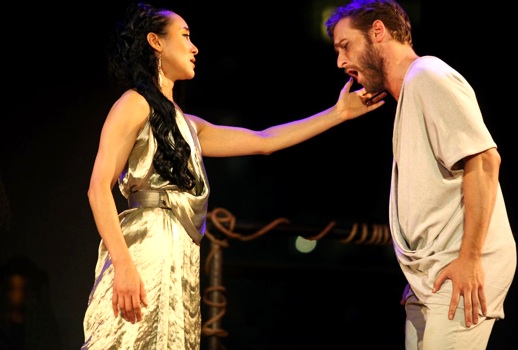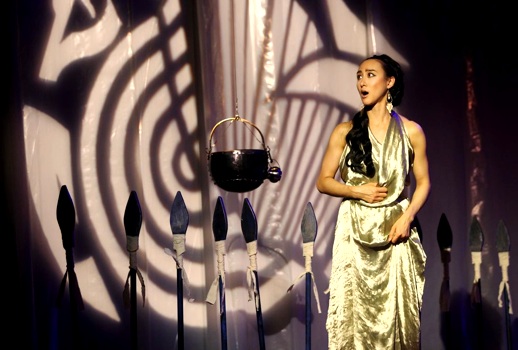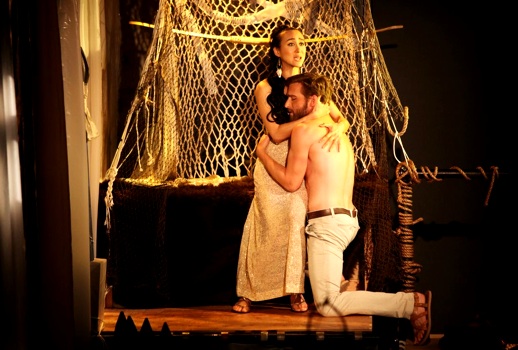
Such, at any rate, was the case a generation ago when, improbably, these works returned to the stage. Today, there’s a healthy audience for baroque opera that cares little about “grand opera” and its traditions. The schools and stages are full of young singers trained in theatrical techniques as well as antique vocal style, and they have no trouble making connections between the two. The principal tradition of baroque opera is to put lively drama across with musical immediacy. These standards were exemplified in Opera Omnia’s presentations of Monteverdi’s L’incoronazione di Poppea and Cavalli’s Giasone at Le Poisson Rouge; they are even clearer in Ulisse, in the more theatrically versatile if less musically comfortable Baryshnikov Center’s Howard Gilman Performance Space.
Space is, indeed, the principal challenge of giving early opera or chamber opera in New York. Grand opera houses, even Broadway-theater-size, will not do: Even if the voices are such as to make the proper effect, huge rooms forfeit the immediacy that conquers the static theatricality of the form. The Met, quite properly, has never risked Monteverdi—the Old Met gave Orfeo, but only once, in concert, at a time when no one knew the music. The City Opera had little luck with him in New York’s first Poppea and two Ulisses.
BAM gave a trilogy of the three surviving Monteverdi operas a decade ago, in borrowed productions, Les Arts Florissants’ Ulisse being the runaway hit. Earlier, Glimmerglass had brought Jonathan Miller’s elegant Poppea to the Harvey/Majestic. Aside from the various music school theaters, one hears Monteverdi and his ilk in all sorts of rooms of varying inappropriateness. New York lacks a Residenz-Theater or a Théâtre de Versailles.

Anne Ridler’s translation for English National Opera is used. There are no distracting titles above, beneath or upon the scenery. You won’t need them; pronunciation is impeccable and the action is clear and swift-moving, in part due to the omission of about an hour’s worth of music—too bad, those cuts, with such a fine cast of singers.
There is some rearrangement as well as cutting of the music: For example, the “genre” duet, comic or amorous relief, for Penelope’s servants: Since these characters are omitted, their pretty number becomes a “flashback,” showing Penelope and Ulysses having rom-com fun before the Trojan War intervenes. This does not add much to a somber drama, but it is a good tune, and if Hai-Ting Chinn and Jesse Blumberg want to sing it for us, why not let them? It certainly strikes a mood they will never play in the opera proper.
Chinn has abandoned soprano parts like Poppea and Cavalli’s Medea and Didone for the mezzo range more suitable to Penelope, a Baker and von Stade role. She portrays the disciplined heroine of myth with restrained gesture (lighting a bowl full of something or other in ritual offering) and maintains her beset dignity as her three undignified suitors (Nicholas Tamagna, Brandon Snook, Richard Lippold—one thought of male Andrews Sisters) lay merry siege to her. Blumberg, familiar to fans of NYFOS, remains a sturdy presence through a long night, in and out of greybeard disguise, at times appealingly barechested.

Joseph Gaines, as Irus, inserted a tidy “goat-bleat” trill in taunting Eumaeus (evidently a goatherd as well as a swineherd), and gave evidence of a comic talent he was not permitted to display thanks to excessive cutting—he really needs the wrestling scene for his comic lament to have its proper effect. Owen McIntosh sang Telemachus with a clear, pleasant tenor, and Elaine Lachica had the far too tiny role of Love.
Avi Stein directed from the harpsichord, and kept things moving unobtrusively and rhythmically. Those desiring a more brilliant sound from the orchestra will have to seek out a performance in a less dry space, perhaps the marvelous one on DVD from Les Arts Florissants.
Julia Noulin-Mérat devised the complex set, on which the action was impressively simple and confusion rare. Muriel Stockdale’s costumes made some witty choices, especially in indicating the gods (blue lipstick, assorted headdresses), but since she went for an indefinitely archaic look for the mortal figures, the intrusion of chinos for Ulysses and sunglasses for suitor Antinous struck false notes.
Performances continue at the Baryshnikov Center on West 37th Street through Thursday night.
Photos: Julieta Cervantes.


